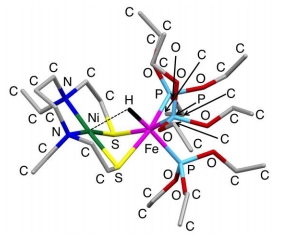June 26, 2013
Japanese Research Group Develops Hydrogen Fuel Cell Needing No Precious Metals
Keywords: Chemicals Environmental Technology University / Research institute

Copyright Kyushu University
A research group comprised of Kyushu University, the Comprehensive Research Organization for Science and Society (CROSS), and Ibaraki University announced on February 6, 2013, that it has developed a new nickel-iron catalyst that allows removal of the electron from hydrogen atoms at ordinary temperatures and pressures. Since the catalyst can be produced using iron, which is inexpensive, it is expected that cheaper fuel cells can be developed to replace those that presently use platinum, which is very expensive.
Up to now, the catalysts used in fuel cells included platinum, at 5,000 yen/gram (about U.S.$53/gram), ruthenium, at 240 yen/gram (about $3/gram), and other precious metals; the research group was able to develop an artificial catalyst using inexpensive iron, at 0.06 yen/gram (about $0.0006/gram), modeled after nickel-iron hydrogenase, a natural enzyme that activates hydrogen.
Since the development of relatively inexpensive fuel cells has become possible as a result of this research, it is expected that hydrogen energy utilization technology will continue to grow.
Related JFS article:
Technology for Basic Fuel Cell without Platinum Developed
Related
"JFS Newsletter"
Related
"Popular Articles"
- New Model Estimates Nitrogen Outflow and Water Pollution from Food Production and Consumption
- Japanese Agricultural Organizations Develop New Phytoremediation Method Using Cd Accumulator Rice Varieties
- RIKEN and Kaneka Successfully Produce Bioplastics from Non-Food Biomass
- Taisei Establishes On-Site Remediation Method for Cyanide-Contaminated Soil
- Pest Control Method Using Sex Pheromone Developed to Keep Sugarcane from White Grubs


